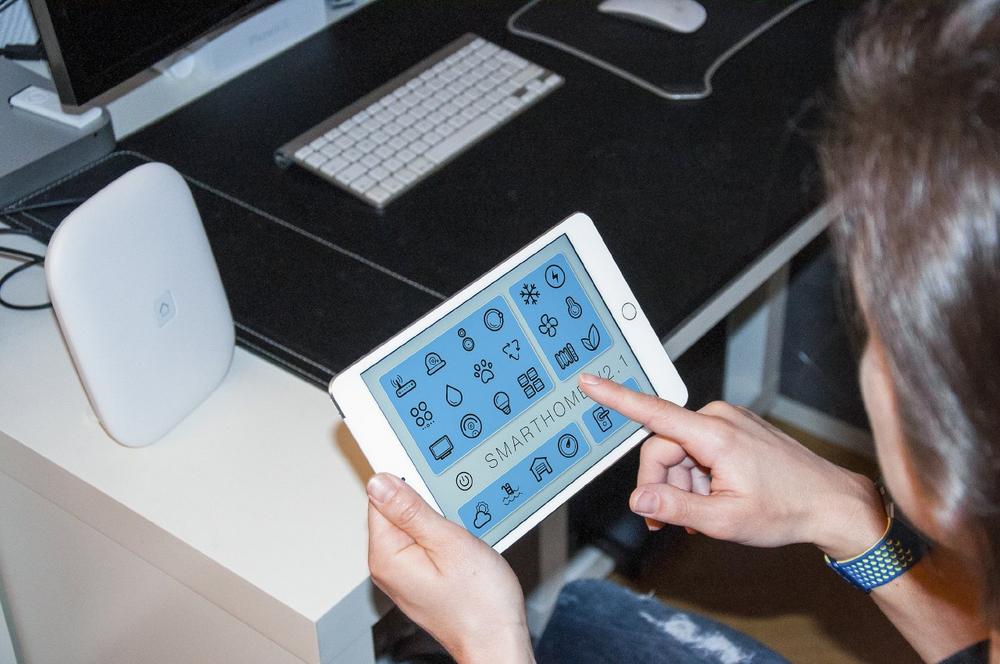Networked devices collect and exchange data
Smart" networked devices include online control systems for roller shutters, lighting or heating as well as televisions, refrigerators or lawnmowers, mobile phones, tablet PCs or baby monitors. "Networked devices need to collect and exchange data in order to function. Otherwise these are not smart. At the same time, they must be well protected against data security and cyber-burglaries", says Dr. Daniel Hamburg, head of the "Center of Excellence Testing and Certification" at TÜV Rheinland, the leading expert for product testing and cybersecurity. Among other things, it demands that standards for testing device security be extended to include tests for data security and cybersecurity. "Otherwise, the Smart Home will open the door to a new kind of burglar."
Cyber criminals: New generation of burglars
In fact, there are already incidents in which it is possible to penetrate systems and products connected to the Internet with comparatively simple means. This is done, for example, via malware or WLAN. In a recent test, for example, experts from TÜV Rheinland hacked an inverter in a solar power system. This would have made it possible to affect connected storage systems or even the power grid itself. Alarm systems or surveillance systems have also been hacked and levered out by burglars.
Ensure compliance with data protection regulations
To ensure that consumers can be more confident that products and systems meet current data protection and online security requirements at the time of purchase, experts demand independent testing according to uniform standards. Dr. Daniel Hamburg: "An example from Germany: The GS mark for tested product safety has existed in Germany for 40 years. We now need a similar test for smart products in order to make tested data security and cybersecurity visible to consumers at a glance. This creates an opportunity for comparison in the market and ensures trust in the manufacturers."
TÜV Rheinland has been developing such tests since 2017: The experts check the data protection and data security of products and applications that are connected to these products. Because an Internet-enabled device is almost always connected to a service, for example mobile and flexible control via a smartphone. When purchasing new smart devices, consumers should always inform themselves about compliance with data protection regulations and not just pay attention to the price.
Cybersecurity Trends presented for the fourth time
TÜV Rheinland’s Cybersecurity Trends were published for the fourth time in 2018. They were researched and compiled over several months within an international team. The report is based on a survey of leading cybersecurity experts from TÜV Rheinland and the experiences of companies in Europe, North America and Asia. To this end, the experts also surveyed companies and organizations in various industries and analyzed security incidents worldwide in the past year.
The Cybersecurity Trends 2018 provide information on eight major developments in data security, IT security, data protection and cyber crime. These include the effects of the new data protection regulations within the European Union – keyword: basic data protection regulation -, the trend towards biometric recognition systems in everyday life and the development of artificial intelligence around cybersecurity.
The complete Cybersecurity Trends 2018 are available free of charge and can be downloaded at www.tuv.com/en/cybersecurity-trends-2018 from TÜV Rheinland.
TÜV Rheinland ist ein weltweit führender unabhängiger Prüfdienstleister mit 145 Jahren Tradition. Im Konzern arbeiten über 20.000 Menschen rund um den Globus. Sie erwirtschaften einen Jahresumsatz von knapp 2 Milliarden Euro. Die unabhängigen Fachleute stehen für Qualität und Sicherheit von Mensch, Technik und Umwelt in fast allen Wirtschafts- und Lebensbereichen. TÜV Rheinland prüft technische Anlagen, Produkte und Dienstleistungen, begleitet Projekte, Prozesse und Informationssicherheit für Unternehmen. Die Experten trainieren Menschen in zahlreichen Berufen und Branchen. Dazu verfügt TÜV Rheinland über ein globales Netz anerkannter Labore, Prüfstellen und Ausbildungszentren. Seit 2006 ist TÜV Rheinland Mitglied im Global Compact der Vereinten Nationen für mehr Nachhaltigkeit und gegen Korruption. Website: www.tuv.com
TÜV Rheinland
Am Grauen Stein
51105 Köln
Telefon: +49 (221) 806-2148
http://www.tuv.com
Pressesprecher Informationssicherheit
Telefon: +49 (221) 806-3060
Fax: +49 (221) 806-3093
E-Mail: Norman.Huebner@de.tuv.com
![]()
